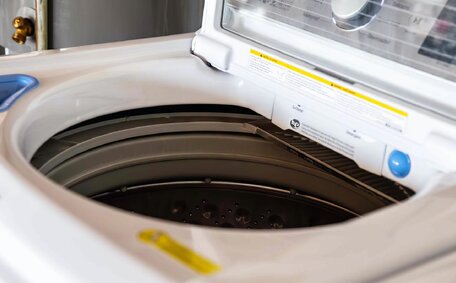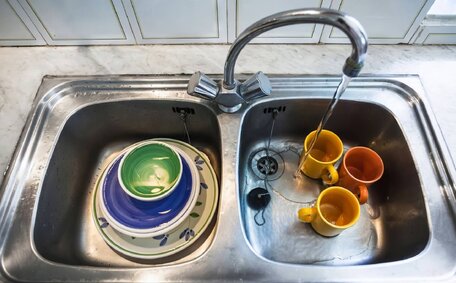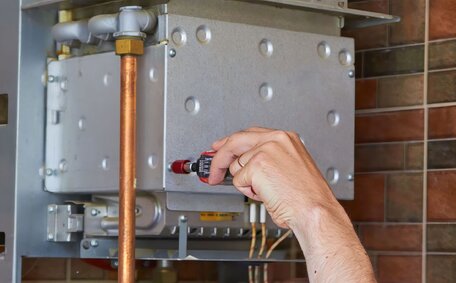What is Hard Water and What Causes It?
Hard water refers to your water that contains high levels of calcium magnesium deposits. These minerals, contributing to the overall mineral content, dissolve naturally into your water supply as it travels through various soil and rock layers, leading to increased hardness. Hard water classification uses the grains per gallon gpg guideline, with a range from slightly hard (1-3.5 gpg) to very hard (>14 gpg).
Here in Parramatta, Sydney, the typical hardness levels affect your water supply significantly, falling into the very high category. This is due to the natural geology of the area which allows more minerals to dissolve into ground and surface water sources as it travels to taps and homes.
In summary, matters once murky are elucidated; what minerals were in the water before it was classified as hard water? It’s caused by water interacting with mineral-rich rock and soils before entering the public water system. The level of minerals in hard water your local system delivers can vary significantly based on geographical and environmental factors.
How Hard Water Affects Your Plumbing
Minerals hard water can have several detrimental effects on your pipes over time due to buildup and scale accumulation.
As hard water flows through pipes and fixtures, The dissolved calcium and magnesium can precipitate out of solution, leaving behind deposits hard water is known for. This water can cause buildup inside pipes, gradually restricting water flow, resulting in decreased water pressure and volume.
Scale deposits also reduce the efficiency and lifespan of your plumbing appliances by clogging valves and heating elements within these systems, accentuating the effects hard water can have. this overexertion can also cause appliances to wear down more quickly than normal, showcasing how efficiency is impacted.
The mineral deposits can cause corrosive effects hard on copper, steel, and plastic pipes and joints. Pinhole leaks and burst pipes, potential symptoms of hard water damage, become increasingly likely over time.
Choosing to overlook how scale can damage your plumbing includes inefficient operation, frequent clogs and leaks, costly repairs and replacements, along with ultimately higher water bills and unnecessary expenses.
Using a water softener system or other water treatments can reduce and prevent the deteriorative effects of hard water buildup your pipes and home infrastructure.
Scale Buildup
When hard water flows through pipes, heaters, appliances and fixtures, limescale buildup occurs as calcium and magnesium come out of solution and solidify. This limescale coating accumulates on the interior of pipes, passes through your hot water heaters, shower heads, taps, and household appliances over time.
As mineral buildup accumulates, it narrows the inside diameter of pipes and blocks small openings in fixtures and valves inside your plumbing network. As flow slows inside a hot water system, the added period of contact raises your utility costs, driving up energy usage due to the straining heating elements or fuel.
This constricts water flow, resulting in decreased water volume and pressure, especially impacting your water heater’s efficiency.
Thick layers of mineral scale act as an insulator that reduces heat transfer, highlighting how does hard water affect heaters as they toil harder to heat water. Your hot water heater may fail more often when choking on excessive hard water buildup. This wastes energy and shortens the lifespan of plumbing appliances affected by hard water.
For commercial clients, scaled equipment and pipes within their commercial plumbing system increase business operating costs and disrupt day-to-day operations. Emergency plumbing repairs cause additional expenses from broken your pipes fixtures, leaks, and replacement costs.
Installing your water softener is the most effective solution to prevent scale buildup system-wide. This reduces expenses related to scale removal, higher utility bills, and premature part replacements over time. Alternative scale control methods like electronic water conditioners help too but have limited effectiveness.
Corrosion
There are several ways hard water minerals accelerate corrosion in plumbing systems due to the accumulation of these substances. As calcium and magnesium deposits build up, they react with pipe materials, leading to deterioration over time.
Copper pipes and fittings are especially vulnerable, as the minerals create an electrolytic reaction that eats away at the metal. Pinholes, cracks, and thin spots in pipes can develop in copper components, eventually leading to leaks and water damage.
Galvanised steel pipes also corrode severely when exposed to hard water minerals and can become completely blocked with buildup. The lifespan of fixtures, valves, and joints is reduced as corrosion loosens connections.
Identifying signs hard water corrosion early is a situation where homeowners need take preventative measures that mitigate further plumbing damage. Signs include low water flow or pressure, rusty water discoloration, staining around joints, leaks, and loose fixtures. Replacing affected sections of pipe and upgrading to corrosion-resistant materials can help stop ongoing deterioration.
Installing a water softener helps to protect your plumbing by removing corrosive minerals. We recommend contacting Parramatta Plumbing to assess your plumbing system and device the best hard water treatment solutions to maximise longevity and prevent leaks.
Clogged Pipes and Drains
Hard water issues often culminate in clogged pipes and drains over time. As Scale build up your pipes along the walls and openings, it restricts water flow and drainage. Your faucets and small pipes are especially prone to blockages.
Warning signs of clogged drains include gurgling sounds, very slow drainage, bad odours, and pooling water. Clogged supply pipes may lead to reduced water pressure and flow, sputtering faucets, and longer wait times for hot water.
Clogs that are not addressed can back up drains, cause overflows, and lead to the type of water damage that clogs left unchecked can damage. They may also result in more serious pipe issues down the road. If you notice any signs of a clog, contact Parramatta Plumbing right away to clear the blockage before permanent damage sets in.
Addressing hard water, a professional hydrojetting service uses highly pressurised water to scour mineral deposits and debris from pipes. Drain augers or plungers can also be used to mechanically clear clogs. For preventative care, installing water softeners or filtration systems can remove minerals from your water before they cause buildup in your pipes.
Rely on the drain cleaning and pipe maintenance services from Parramatta Plumbing to keep your plumbing system running efficiently. Preventative care saves you money over time by avoiding emergency clog situations and the subsequent service repairs they necessitate.
The Effects of Hard Water on Appliances
Hard water can have effects your washing machine’s lifespan and efficiency, dishwashers and water heaters. As scale builds up inside plumbing fixtures, valves, pipes, and heating elements, it restricts water flow and inhibits heat transfer.
This strain, a clear sign of how hard water affect your appliances, means they must exert more energy, which impacts your energy consumption and can eventually lead to breakdowns. For example, a water heater choking on mineral deposits has to burn more fuel to heat water. Appliances such as your dishwasher and washing machines experience reduced rinse performance when spray arms and soap dispensers become clogged.
Mineral scale promotes conditions where soap scum can lead to bacterial growth inside appliances, potentially causing odours or unsanitary conditions. In hot water heaters, thick scale coatings act as insulation that slows heat transfer and drives up energy usage.
To discover more about hard water and maximising appliance lifespan, consider installing a water softener system or exploring other scale prevention solutions. Soft water allows your appliances to operate efficiently for years to come with fewer costly repairs. Protect your investment with proper hard water treatment.
The professionals at Parramatta Plumbing can assess your water systems and recommend customised whole-house or point-of-use water softening solutions to meet your household needs. Contact us today.
Solutions for Treating Hard Water
There are several effective solutions for treating hard water to prevent the negative impact hard water on your plumbing system.
Water Softeners
Water softeners are the most common and practical solution for residential and commercial buildings. They use an ion exchange process to remove the minerals your water contains by replacing calcium and magnesium with sodium or potassium ions.
The soft water produced after treatment facilitates proper lathering, allowing for better results when using water in daily activities and preventing scale buildup in your plumbing. This maintains normal water pressure and flow, helping to extend life your equipment and its efficient performance.
Water softeners may use salt, potassium chloride pellets, or electromagnetic waves to facilitate the ion exchange process. We recommend fully automatic models that clean and regenerate on a preset schedule for low maintenance operation.
Reverse Osmosis Systems
Reverse osmosis (RO) systems push water your home uses through a semipermeable membrane to filter out dissolved minerals. They remove over 90% of calcium and magnesium to effectively soften water.
Under-sink and wholehouse water RO systems are available for installation. However, water wastage and slow output make these units impractical for households with high water demands.
Water Filtration
Standard water filters (pitcher or tap-mounted) use a medium like activated carbon to trap some mineral particles. While they improve taste and odour, most filters do not soften water or reduce scale buildup.
Specialty scale prevention filters contain media that binds to calcium and magnesium ions. Though less effective than a softener, these filters provide an alternative for households that want to moderate water hardness.
Maintenance Services
To prevent lasting damage, regular maintenance cleaning to get rid of accumulated mineral scale is essential, regardless of your hard water solution. Services like pipe descaling and drain cleaning offered by Parramatta Plumbing prolong system lifespan.
We assess your unique water quality profile and plumbing setup to engineer the right hardness reduction plan. Contact Parramatta Plumbing today to protect your home’s pipes from scale and corrosion.






